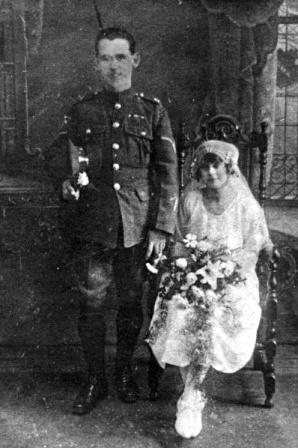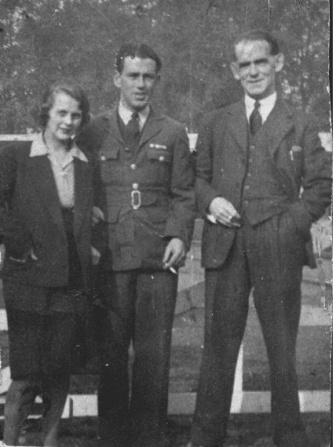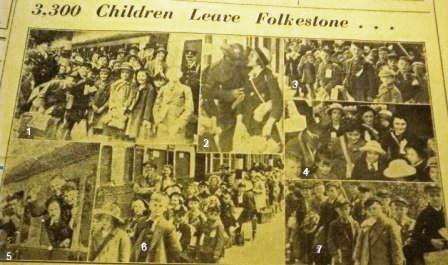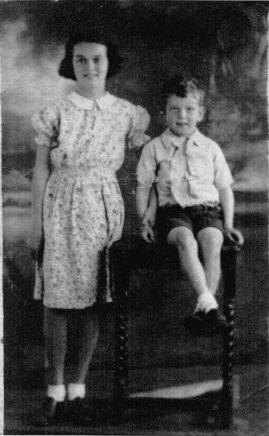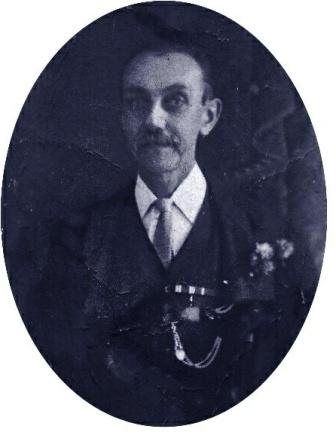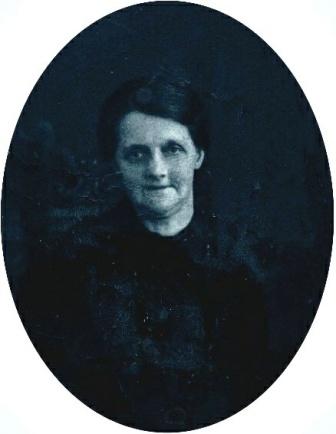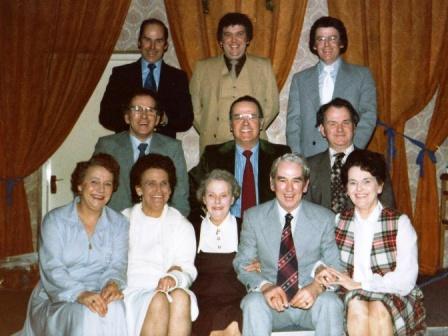Peter Campbell was the son of Henry and Rosina Campbell who were married at Elham near Folkestone in 1921.
I would like to thank Peter for sharing these memories of what it was like for a small child in Folkestone at the start of WW2 and the experience of being evacuated to Wales with his school in 1940. Evacuation Notice 27th May 1940 MEMORIES BEFORE EVACUATIONAll of a sudden life became very strange to me as a little boy six years old. I didn′t know what was happening, Shops were all being boarded up big tin sheds were being built in tunnels under the ground at the end of the streets; they were called air raid shelters. All along the sands where we played was all sealed off with rolls of barbed wire it was all very confusing.Everybody seemed to be wearing uniforms soldiers, sailors, airmen even the women were dressed up as nurses. There were armoured cars, tanks, lorries full of soldiers all over the place. My Dad said it′s OK it′s just in case the enemy try to attack us. Then we saw great big grey balloons in the sky with big ears we thought a circus was coming to town, Dad said no the balloons had a lot of strong wires hanging from them this was to try to bring down enemy planes that would come in low to drop their bombs. At school we were all given a cardboard box with a long string tied to it inside was an ugly thing, a rubber mask this was a gas mask which everybody had to wear just in case there was a Gas attack. Every day we would have to put them on for a short while just to practice, we thought it was funny because we all looked like monsters! Also, if you blew hard when you had them on it made very rude noises! We were told if we did not have a mask on we would be very sick, so everywhere we went from that day on the box went with you hung around your neck. Grownups had them, they even had one you could put a baby in! My Mum and Dad were putting brown sticking tape all over the windows, and hanging black sheets they looked terrible and dark. We were told it was necessary to stop any lights shining out at night and anyway there were men patrolling the streets they wore black tin helmets with the letters A.R.P. painted on them and if they saw a light they would bang on the door a shout “Put that light out”. We asked why they had letters on the helmets Dad said it stood for Air Raid Precautions they were volunteers just helping to make us safe. Cars had special black hoods over their headlights; this we were told was all done so that enemy planes would not be able to see our town at night. Down at the bottom of the garden my Dad built a big shed and put a heavy roof on it and a door I thought it was going to be a den for us to play in because it had lots of things in it bunk beds, blankets, tins of biscuits and cakes, drinks, books and comics, but he said no it was a shelter which we would all use if necessary to keep us safe. I did not understand what he meant. When the air raid sirens started I was very frightened Dad said they were just testing, if it was a wining noise up and down it was danger when it was a long blast it was the all clear. Many times we would have to get up to go in the shelter but Mum made us sandwiches and hot drinks and we would sing and play games. I thought it was great at night you could see big beams of light sweeping across the sky Dad said they were search lights looking for enemy planes. Once or twice I remember it was too wet to go outside so we hid under the stairs, we were lucky we heard plenty of bangs but nothing else. Some houses further down were damaged but nobody told me anything. My Dad always had the radio on at night so we had to be very quiet. I remember we used to climb up a big grassy hill called Sugar Loaf Hill it looked right down on to the harbour and out into the Channel, we used to watch the ships out at sea and see big splashes in the water nearly hitting the boats and aeroplanes up in the sky then coming down very low we saw some crash into the sea making very big splashes, we thought it was very exciting – but we really did not understand what was happening. One day at school the siren sounded so we all had to go down in the air raid shelters which had been dug in the sides of the bank with seats and lights and plenty of things to play with. We sat there with our teachers they gave us chocolate and lemonade and we were singing when there was a very loud bang it really shook the ground around us. It was very frightening then it all went quiet, when the all clear siren went we all came out. Our school was alright but on the golf course which is right near our school there was clouds of smoke and a very big hole with a plane sticking out of it, its tail high in the air with a funny cross on it, we were told it was a German plane. I could not get home fast enough to tell my Dad as he worked at the RAF station in Folkestone but he already knew all about it. I was so disappointed that he knew before me, he said it had tried to bomb the station but was shot down by one of our planes. So things were getting worse more and more air raids everybody looked sad, some days we couldn′t get to school because of holes in the roads, I did not worry too much as we could play at home, but Mum and Dad were not happy..... THE EVACUATIONI am not quite sure of the date. It must have been around May 1940.I was six years old. I lived in a lovely seaside town on the south coast of England called Folkestone in Kent with my Mum and Dad and 3 sisters and my 5 brothers. I was very proud of my eldest brother Harry he was in the RAF.
I went to a Catholic school called ‘Stella Maris’ with my sisters Pat and Ivy and two brothers Gordon and Terry they were all older than me. My teacher was called Sister St Teresa and our Head was Sister St John. One day we were all at school assembly as every morning, I never used to listen to very much; I would be looking out of the window up at the sky to see if I could see any fighter planes. Our Head Mistress was telling us that because of the war and the risk of bombing, the government said it would be necessary for all the school children to be sent to a part of the country that would be safe from any bombs. We would be going to a town in South Wales called Merthyr Tydfil, we had no idea where Wales was or how far away, my sister said it was over 200 miles. I thought it would be very nice to go away on holiday it sounded like fun, but what I did not realise was that my Mum and Dad and my little brothers, too young to be at school, would not be coming with us and we would have to stay there until the war was over. I couldn′t wait to get home a tell my Mum and Dad but they already knew and were very sad, they did not want us to go to a strange place on our own, but we knew our teachers were coming with us, so it would not be too bad and the whole school would be together. During the next week we were all busy getting our things together we would not be able to take any toys just things like change of clothes, underwear, pyjamas, soap, toothbrush, shoes and such like, but I did manage to stuff my teddy ‘Chuckles’ in. The school said we would get new things when we got to our new homes. Then the day came for us to leave home – we all met at school about 100 children. Our teachers called the register to make sure we were all present then tied labels on our coat collars, which had not to be taken off because it had our Name, Address, School and Age also where we were going to. We all had to carry our gas masks which we had been doing for a long time, our little parcels of clothes, and we were taken to the railway station where there was a very long train waiting. We said goodbye to our Mums and Dads everybody was crying but we all tried to be brave and hoped we would all be together again soon. As the train left the station everybody was still waving, There were over 800 children on the train from all schools in Folkestone and Dover, we sat down and cried but our teachers said come on let′s all sing and we did.
It was about 10 in the morning and a very hot sunny day we were told that we would be stopping at stations on the way to get refreshments, and would reach Merthyr Tydfil by 2 in the afternoon. It was a terrible journey the sun was too hot through the windows of the train and there were air raids. The train had to stop just in case the German planes bombed the rails or the train. My brown paper parcel got very hot in the sun which gave of a funny smell I was very sick we did not reach Merthyr Tydfil until 5.30pm. There were no buses to meet us so we were told we would have to walk to a mission hall, which was at the top of this steep hill. We set off to walk in twos hand in hand, People were lining the street right to the top, waving flags and cheering. I think they were trying to make us welcome, some were crying especially the women I suppose they felt sorry for us. Half way up the hill the string on my parcel came off and I dropped everything all over the street. Some kind ladies ran forward and picked them all up, wrapped them up again and carried it up to the mission hall. When we arrived we were given lemonade and cakes to eat while the teachers and staff decided what would happen next. We were all very tired and wanted to sleep. After a while they came to us, that is me and my brother and sisters, and told us we would not all be able to stay together, that me being the youngest would stay with my eldest sister Pat which was good but my other sister Ivy would be on her own, as would Gordon and Terry. Soon a couple came to us to take us to their home a Mr and Mrs Evans. Our teachers said we would all meet back at the hall in the morning, I never saw where my sister and brothers went. We left and went with Mr and Mrs Evans to go to their home. The first night was very strange I did not sleep very well, I just wanted to be back home with my Mum and Dad, my sister Pat said it would be alright the war would not last very long we would soon be home again. Next day we went back to the church hall to find out about our new school, we also saw my sister and brothers again; they were staying in a different part of the town. The school we were going to was called St Illtyd′s not far from where we were staying. It was a big school and everybody there thought we were funny because we did not talk like them but they were nice to us. After a couple of weeks things were not right where we were staying. They were cruel to us, we were told not to come home till late, sometimes we had to go to school without any breakfast. I cried quite a lot and told my teacher I wanted to go home and we were not happy with Mr and Mrs Evans my sister told her teacher they were cruel to us. The next day we were moved from there to another house, to a Mr and Mrs Mahoney they were very nice and made us welcome right away. We had good food warm and comfortable beds. They wrote to our parents to tell them we were OK.
There was no bathroom so having a bath was quite an ordeal. In the back yard hanging on the wall was a big long tin bath, on bath nights twice a week the bath was brought into the living room and put in front of the coal fire. The bath would then be filled with part cold water then boiling water from kettles until it was warm enough. I was lucky I got the first bath then my sister Pat had the same water and when my brother Terry came to stay that was three in the same water, we had to be quick because the water did not stay hot for very long. My brother Terry said it was great because where he had been staying before he had to have his bath outside! Then one day about two years after we had moved to Wales, we were told some great news; we as a family were going to be all together once again. My Dad who worked for the Air Ministry was to be posted to Carlisle – which was considered to be a safe part of the country. Everybody was happy that we were going home although they would miss us and we would miss them, our teachers, friends, Mr and Mrs Mahoney. We felt sorry for all the other children we were leaving behind, they would have to stay there until the war finished. So the day came for us to say goodbye to everybody Mr and Mrs Mahoney were very sad, they had been very good to us. We promised to keep in touch with them. On the train to our new home in Carlisle (we really could not say it properly) we were told it was in Scotland and everybody wears a kilt! We were very excited and happy and could not wait to see our Mum and Dad and baby brothers again after two years. The further we travelled north the more mountains we saw it was fantastic we had never seen mountains as big before. We were met at the station by our Mum and Dad I thought they looked a lot different since we last saw them two years ago. We jumped off the train and gave them lots of hugs and kisses. Mum said we all looked very grown up. It was a strange place Carlisle very big and noisy not a bit like Merthyr, but the difference was we were all together one happy family! We got on to a bus to take us to our new home which was in Dalston Road, It was a very big house with lots of rooms. We were met by our Granddad and the rest of the family and had a great big party which went on for ages.
Life changed again; new town, new school, new friends. We were very happy to be able to say we were no longer evacuees, but we couldn′t help thinking about our other Mum and Dad who looked after us so well and all our school friends we had left behind in Merthyr Tydfil, South Wales. Like all good stories this has a fairytale ending..... and we all lived happy ever after!
Peter Campbell 2007 | |||||||||||||||||||||
